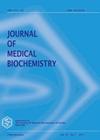Value of altered methylation patterns of genes RANBP3, LCP2 and GRAP2 in cfDNA in breast cancer diagnosis
IF 2
4区 医学
Q4 BIOCHEMISTRY & MOLECULAR BIOLOGY
引用次数: 0
Abstract
Background: The purpose of this study was to investigate the potential of plasma cfDNA methylation patterns in reflecting tumor methylation changes, focusing on three candidate sites, cg02469161, cg11528914, and cg20131654. These sites were selected for verification, with a particular emphasis on their association with breast cancer. Methods: We conducted a comprehensive analysis of 850k whole-methylation sequencing data to identify potential markers for breast cancer detection. Subsequently, we examined the methylation status of genes RANBP3, LCP2, and GRAP2, where the aforementioned sites are located, using cancer and cancer-adjacent tissues from 17 breast cancer patients. We also assessed the methylation patterns in different molecular subtypes and pathological grades of breast cancer. Additionally, we compared the methylation levels of these genes in plasma cfDNA to their performance in tissues. Results: Our analysis revealed that RANBP3, LCP2, and GRAP2 genes exhibited significant methylation differences between cancer and cancer-adjacent tissues. In breast cancer, these genes displayed diagnostic efficiencies of 91.0%, 90.6%, and 92.2%, respectively. Notably, RANBP3 showed a tendency towards lower methylation in HR+ breast cancer, and LCP2 methylation was correlated with tumor malignancy. Importantly, the methylation levels of these three genes in plasma cfDNA closely mirrored their tissue counterparts, with diagnostic efficiencies of 83.3%, 83.9%, and 77.6% for RANBP3, LCP2, and GRAP2, respectively. Conclusions: Our findings suggest that RANBP3, LCP2, and GRAP2 genes, located at the identified methylation sites, can serve as valuable blood molecular markers for the auxiliary diagnosis of breast cancer. This research provides a foundation for further exploration of gene methylation pattern changes in cfDNA for the detection of breast cancer and other cancer types.cfDNA 中 RANBP3、LCP2 和 GRAP2 基因甲基化模式的改变在乳腺癌诊断中的价值
研究背景本研究的目的是调查血浆 cfDNA 甲基化模式在反映肿瘤甲基化变化方面的潜力,重点是三个候选位点:cg02469161、cg11528914 和 cg20131654。我们选择这些位点进行验证,特别强调它们与乳腺癌的关联。方法我们对 850k 个全甲基化测序数据进行了全面分析,以确定乳腺癌检测的潜在标记物。随后,我们利用 17 位乳腺癌患者的癌组织和癌相邻组织,检测了上述位点所在基因 RANBP3、LCP2 和 GRAP2 的甲基化状态。我们还评估了不同分子亚型和病理分级乳腺癌的甲基化模式。此外,我们还比较了血浆 cfDNA 中这些基因的甲基化水平及其在组织中的表现。结果我们的分析表明,RANBP3、LCP2 和 GRAP2 基因在癌症组织和癌症邻近组织中表现出显著的甲基化差异。在乳腺癌中,这些基因的诊断效率分别为 91.0%、90.6% 和 92.2%。值得注意的是,RANBP3 在 HR+ 乳腺癌中显示出较低的甲基化趋势,而 LCP2 的甲基化与肿瘤的恶性程度相关。重要的是,这三个基因在血浆 cfDNA 中的甲基化水平与组织中的甲基化水平密切相关,RANBP3、LCP2 和 GRAP2 的诊断效率分别为 83.3%、83.9% 和 77.6%。结论我们的研究结果表明,位于已确定甲基化位点的 RANBP3、LCP2 和 GRAP2 基因可作为有价值的血液分子标记物用于乳腺癌的辅助诊断。这项研究为进一步探索 cfDNA 中基因甲基化模式的变化以检测乳腺癌和其他癌症类型奠定了基础。
本文章由计算机程序翻译,如有差异,请以英文原文为准。
求助全文
约1分钟内获得全文
求助全文
来源期刊

Journal of Medical Biochemistry
BIOCHEMISTRY & MOLECULAR BIOLOGY-
CiteScore
3.00
自引率
12.00%
发文量
60
审稿时长
>12 weeks
期刊介绍:
The JOURNAL OF MEDICAL BIOCHEMISTRY (J MED BIOCHEM) is the official journal of the Society of Medical Biochemists of Serbia with international peer-review. Papers are independently reviewed by at least two reviewers selected by the Editors as Blind Peer Reviews. The Journal of Medical Biochemistry is published quarterly.
The Journal publishes original scientific and specialized articles on all aspects of
clinical and medical biochemistry,
molecular medicine,
clinical hematology and coagulation,
clinical immunology and autoimmunity,
clinical microbiology,
virology,
clinical genomics and molecular biology,
genetic epidemiology,
drug measurement,
evaluation of diagnostic markers,
new reagents and laboratory equipment,
reference materials and methods,
reference values,
laboratory organization,
automation,
quality control,
clinical metrology,
all related scientific disciplines where chemistry, biochemistry, molecular biology and immunochemistry deal with the study of normal and pathologic processes in human beings.
 求助内容:
求助内容: 应助结果提醒方式:
应助结果提醒方式:


